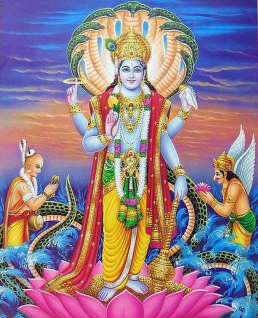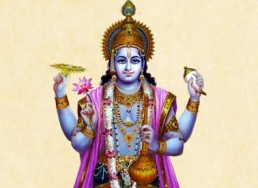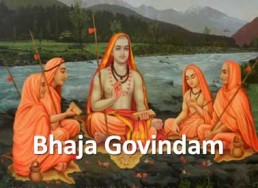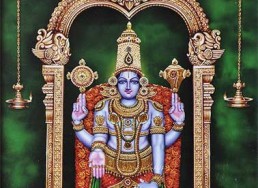Bhaja Govindam All Verses
गोविन्दं भज मूढमते |
सम्प्राप्ते सन्निहिते काले
नहि नहि रक्षति डुक्रिङ्करणे ‖ 1 ‖
govindaṃ bhaja mūḍhamate |
samprāpte sannihite kāle
nahi nahi rakṣati ḍukriṅkaraṇe ‖ 1 ‖
कुरु सद्बुद्धिम् मनसि वितृष्णाम् |
यल्लभसे निज कर्मोपात्तं
वित्तं तेन विनोदय चित्तम् ‖ 2 ‖
kuru sadbuddhim manasi vitṛṣṇām |
yallabhase nija karmopāttaṃ
vittaṃ tena vinodaya cittam ‖ 2 ‖
दृष्ट्वा मा गा मोहावेशम् |
एतन्मांस वसादि विकारं
मनसि विचिन्तया वारं वारम् ‖ 3 ‖
dṛṣṭvā mā gā mohāveśam |
etanmāṃsa vasādi vikāraṃ
manasi vicintayā vāraṃ vāram ‖ 3 ‖
तद्वज्जीवित मतिशय चपलम् |
विद्धि व्याध्यभिमान ग्रस्तं
लोकं शोकहतं च समस्तम् ‖ 4 ‖
tadvajjīvita matiśaya capalam |
viddhi vyādhyabhimāna grastaṃ
lokaṃ śokahataṃ ca samastam ‖ 4 ‖
तावन्-निजपरिवारो रक्तः |
पश्चाज्जीवति जर्जर देहे
वार्तां कोऽपि न पृच्छति गेहे ‖ 5 ‖
tāvan-nijaparivāro raktaḥ |
paścājjīvati jarjara dehe
vārtāṃ ko’pi na pṛcchati gehe ‖ 5 ‖
तावत्-पृच्छति कुशलं गेहे |
गतवति वायौ देहापाये
भार्या बिभ्यति तस्मिन् काये ‖ 6 ‖
tāvat-pṛcchati kuśalaṃ gehe |
gatavati vāyau dehāpāye
bhāryā bibhyati tasmin kāye ‖ 6 ‖
तरुण स्तावत् तरुणीसक्तः |
वृद्ध स्तावत्-चिन्तामग्नः
परमे ब्रह्मणि कोऽपि न लग्नः ‖ 7 ‖
taruṇa stāvat taruṇīsaktaḥ |
vṛddha stāvat-cintāmagnaḥ
parame brahmaṇi ko’pi na lagnaḥ ‖ 7 ‖
संसारोऽयमतीव विचित्रः |
कस्य त्वं वा कुत आयातः
तत्वं चिन्तय तदिह भ्रातः ‖ 8 ‖
saṃsāro’yamatīva vicitraḥ |
kasya tvaṃ vā kuta āyātaḥ
tatvaṃ cintaya tadiha bhrātaḥ ‖ 8 ‖
निस्सङ्गत्वे निर्मोहत्वम् |
निर्मोहत्वे निश्चलतत्त्वं
निश्चलतत्त्वे जीवन्मुक्तिः ‖ 9 ‖
nissaṅgatve nirmohatvam |
nirmohatve niścalatattvaṃ
niścalatattve jīvanmuktiḥ ‖ 9 ‖
शुष्के नीरे कः कासारः |
क्षीणे वित्ते कः परिवारः
ज्ञाते तत्त्वे कः संसारः ‖ 10 ‖
śuṣke nīre kaḥ kāsāraḥ |
kṣīṇe vitte kaḥ parivāraḥ
jñāte tattve kaḥ saṃsāraḥ ‖ 10 ‖
हरति निमेषात्-कालः सर्वम् |
मायामयमिदम्-अखिलं हित्वा
ब्रह्मपदं त्वं प्रविश विदित्वा ‖ 11 ‖
harati nimeṣāt-kālaḥ sarvam |
māyāmayamidam-akhilaṃ hitvā
brahmapadaṃ tvaṃ praviśa viditvā ‖ 11 ‖
शिशिर वसन्तौ पुनरायातः |
कालः क्रीडति गच्छत्यायुः
तदपि न मुञ्चत्याशावायुः ‖ 12 ‖
śiśira vasantau punarāyātaḥ |
kālaḥ krīḍati gacchatyāyuḥ
tadapi na muñcatyāśāvāyuḥ ‖ 12 ‖
कथितो वैया करणस्यैषः |
उपदेशो भूद्-विद्या निपुणैः
श्रीमच्छङ्कर भगवच्छरणैः ‖ 13 ‖
kathito vaiyā karaṇasyaiṣaḥ |
upadeśo bhūd-vidyā nipuṇaiḥ
śrīmacchaṅkara bhagavaccharaṇaiḥ ‖ 13 ‖
वातुल किं तव नास्ति नियन्ता |
त्रिजगति सज्जन सङ्गतिरेका
भवति भवार्णव तरणे नौका ‖ 14 ‖
vātula kiṃ tava nāsti niyantā |
trijagati sajjana saṅgatirekā
bhavati bhavārṇava taraṇe naukā ‖ 14 ‖
काषायान्बर बहुकृत वेषः |
पश्यन्नपि च न पश्यति मूढः
उदर निमित्तं बहुकृत वेषः ‖ 15 ‖
kāṣāyānbara bahukṛta veṣaḥ |
paśyannapi ca na paśyati mūḍhaḥ
udara nimittaṃ bahukṛta veṣaḥ ‖ 15 ‖
दशन विहीनं जातं तुण्डम् |
वृद्धो याति गृहीत्वा दण्डं
तदपि न मुञ्चत्याशा पिण्डम् ‖ 16 ‖
daśana vihīnaṃ jātaṃ tuṇḍam |
vṛddho yāti gṛhītvā daṇḍaṃ
tadapi na muñcatyāśā piṇḍam ‖ 16 ‖
रात्रौ चुबुक समर्पित जानुः |
करतल भिक्षस्-तरुतल वासः
तदपि न मुञ्चत्याशा पाशः ‖ 17 ‖
rātrau cubuka samarpita jānuḥ |
karatala bhikṣas-tarutala vāsaḥ
tadapi na muñcatyāśā pāśaḥ ‖ 17 ‖
व्रत परिपालनम्-अथवा दानम् |
ज्ञान विहीनः सर्वमतेन
भजति न मुक्तिं जन्म शतेन ‖ 18 ‖
vrata paripālanam-athavā dānam |
jñāna vihīnaḥ sarvamatena
bhajati na muktiṃ janma śatena ‖ 18 ‖
शय्या भूतलम्-अजिनं वासः |
सर्व परिग्रह भोगत्यागः
कस्य सुखं न करोति विरागः ‖ 19 ‖
śayyā bhūtalam-ajinaṃ vāsaḥ |
sarva parigraha bhogatyāgaḥ
kasya sukhaṃ na karoti virāgaḥ ‖ 19 ‖
सङ्गरतो वा सङ्गविहीनः |
यस्य ब्रह्मणि रमते चित्तं
नन्दति नन्दति नन्दत्येव ‖ 20 ‖
saṅgarato vā saṅgavihīnaḥ |
yasya brahmaṇi ramate cittaṃ
nandati nandati nandatyeva ‖ 20 ‖
गङ्गा जललव कणिका पीता |
सकृदपि येन मुरारी समर्चा
क्रियते तस्य यमेन न चर्चा ‖ 21 ‖
gaṅgā jalalava kaṇikā pītā |
sakṛdapi yena murārī samarcā
kriyate tasya yamena na carcā ‖ 21 ‖
पुनरपि जननी जठरे शयनम् |
इह संसारे बहु दुस्तारे
कृपयाऽपारे पाहि मुरारे ‖ 22 ‖
punarapi jananī jaṭhare śayanam |
iha saṃsāre bahu dustāre
kṛpayā’pāre pāhi murāre ‖ 22 ‖
पुण्यापुण्य विवर्जित पन्थः |
योगी योग नियोजित चित्तः
रमते बालोन्मत्तवदेव ‖ 23 ‖
puṇyāpuṇya vivarjita panthaḥ |
yogī yoga niyojita cittaḥ
ramate bālonmattavadeva ‖ 23 ‖
का मे जननी को मे तातः |
इति परिभावय निज संसारं
सर्वं त्यक्त्वा स्वप्न विचारम् ‖ 24 ‖
kā me jananī ko me tātaḥ |
iti paribhāvaya nija saṃsāraṃ
sarvaṃ tyaktvā svapna vicāram ‖ 24 ‖
व्यर्थं कुप्यसि मय्यसहिष्णुः |
भव समचित्तः सर्वत्र त्वं
वाञ्छस्यचिराद्-यदि विष्णुत्वम् ‖ 25 ‖
vyarthaṃ kupyasi mayyasahiṣṇuḥ |
bhava samacittaḥ sarvatra tvaṃ
vāñchasyacirād-yadi viṣṇutvam ‖ 25 ‖
मा कुरु यत्नं विग्रह सन्धौ |
सर्वस्मिन्नपि पश्यात्मानं
सर्वत्रोत्-सृज भेदाज्ञानम् ‖ 26 ‖
mā kuru yatnaṃ vigraha sandhau |
sarvasminnapi paśyātmānaṃ
sarvatrot-sṛja bhedājñānam ‖ 26 ‖
त्यक्त्वाऽऽत्मानं पश्यति सोऽहम् |
आत्मज्ञ्नान विहीना मूढाः
ते पच्यन्ते नरक निगूढाः ‖ 27 ‖
tyaktvā”tmānaṃ paśyati so’ham |
ātmajñnāna vihīnā mūḍhāḥ
te pacyante naraka nigūḍhāḥ ‖ 27 ‖
ध्येयं श्रीपति रूपम्-अजस्रम् |
नेयं सज्जन सङ्गे चित्तं
देयं दीनजनाय च वित्तम् ‖ 28 ‖
dhyeyaṃ śrīpati rūpam-ajasram |
neyaṃ sajjana saṅge cittaṃ
deyaṃ dīnajanāya ca vittam ‖ 28 ‖
पश्चाद्धन्त शरीरे रोगः |
यद्यपि लोके मरणं शरणं
तदपि न मुञ्चति पापाचरणम् ‖ 29 ‖
paścāddhanta śarīre rogaḥ |
yadyapi loke maraṇaṃ śaraṇaṃ
tadapi na muñcati pāpācaraṇam ‖ 29 ‖
नास्ति ततः सुख लेशः सत्यम् |
पुत्रादपि धनभाजां भीतिः
सर्वत्रैषा विहिता रीतिः ‖ 30 ‖
nāsti tataḥ sukha leśaḥ satyam |
putrādapi dhanabhājāṃ bhītiḥ
sarvatraiṣā vihitā rītiḥ ‖ 30 ‖
नित्यानित्य विवेक विचारम् |
जाप्यसमेत समाधि विधानं
कुर्व वधानं महद्-अवधानम् ‖ 31 ‖
nityānitya viveka vicāram |
jāpyasameta samādhi vidhānaṃ
kurva vadhānaṃ mahad-avadhānam ‖ 31 ‖
संसाराद्-अचिराद्-भव मुक्तः |
सेन्दिय मानस नियमादेवं
द्रक्ष्यसि निज हृदयस्थं देवम् ‖ 32 ‖
saṃsārād-acirād-bhava muktaḥ |
sendiya mānasa niyamādevaṃ
drakṣyasi nija hṛdayasthaṃ devam ‖ 32 ‖
डुकृण्करणाध्ययन धुरीणः |
श्रीमच्छङ्कर भगवच्चिष्यैः
बोधित आसीच्छोदित करणैः ‖ 33 ‖
इति मोहमुद्गरः संपूर्णः।।
ḍukṛṇkaraṇādhyayana dhurīṇaḥ |
śrīmacchaṅkara bhagavacciṣyaiḥ
bodhita āsīcchodita karaṇaiḥ ‖ 33 ‖
iti mohamudgaraḥ saṃpūrṇaḥ..
Thus ends the Moha Mudgara (Hammer of Delusion – Another name for Bhaja Govindam)

Description
Note: For the popular version of Bhaja Govindam by Smt. MS Subbalakshmi please click here. Bhaja Govindam sung by M.S. Subbalakshmi For all verses of Bhaja Govindam with word by word meaning please use this link.
Bhaja Govindam (Praise Govinda/Repeat the name of Govinda), is one of the most popular hymns penned by Shankara, that is still sung and recited by millions of Hindus every day. The hymn is steeped in the emotion of bhakti, urging the need for devotion to the Lord as against mechanical acquisition of conventional knowledge. The legend is that Shankara spontaneously composed this hymn in Varanasi on being irritated by the sound of an aged person loudly trying to learn the rules of grammar by rote. Its basic refrain is that surrender yourself to Govinda, the Lord, for the rules of grammar will not profit you once the hour of death draws near.
It is presumed that the first twelve verses came spontaneously from Sankara (hence the hymn bears the title dvādaśa mañjarikā stotram – a hymn composed of twelve-verse-blossoms) and that each of the fourteen disciples contributed one verse each. Sankara finished the last five verses. This song is also known as Moha Mudgara (the hammer that destroys delusion).
This composition, like many others, written by Shankara, wherein he underlines the importance of devotion and surrender, and pours his heart out in obeisance to a deity in the Hindu pantheon, may surprise those who associate him only with the jnana marga or the path of knowledge to salvation. The jnana marga was, indeed, the path that Shankara believed to be the most efficacious in the search for knowledge of Brahman, and consequently of moksha. However—and this is the important point – he never forbid prayer and worship animated by the spirit of self-surrender and bhakti. The conventional modes of religious practice, if sufficiently suffused by the yearning for spiritual grace, had his sanction. Under the rubric of apara vidya, or practical knowledge Shankara endorsed such outpourings of devotion as a preparatory step to the para knowledge of Brahman.
The Bhaja Govindam invokes a strong mood of vairagya or renunciation given the transience of the reasons of human pride. We surround ourselves with coordinates of assurance—family, children, wealth, fame, youth, and considering them permanent, spend a lifetime seeking to preserve the inherently ephemeral and momentary, while shutting our eyes to the inevitability of death. It is only when death approaches do we understand the mirage we treasured, and by then, very often, it is too late to pursue the path of jnana that alone can give us lasting happiness and contentment.
For Shankara then, the learning of grammar, as an end in itself, without realising the nature of our finite lives, is a metaphor to highlight the imperative need to acquire that wisdom in the light of which alone we can achieve lasting happiness. Surrender to a personal God-in this case Govinda or Krishna is the first step in moving towards that wisdom.
The above is an excerpt from the book ‘Adi Shankaracharya’ by Pavan K Varma
———————————————————–
Significance of Bhaja Govindam
Bhaja Govindam was written by Jagadguru Adi Shankaracharya. Bhaja Govindam is one of the minor compositions of the spiritual giant, Adi Shankaracharya. It is classified as a prakarana grantha, a primer to the major works. Though sung as a Bhajan, it contains the essence of Vedanta and implores the man to think, Why am I here in this life ? Why am I amassing wealth, family, but have no peace ? What is the Truth ? What is the purpose of life ? The person thus awakened gets set on a path to the inner road back to the God principle.
The background of Bhaja Govindam is worth examining. During his stay in Kashi, Adi Shankaracharya noticed a very old man studying the rules of Sanskrit by Panini. Shankara was touched with pity at seeing the plight of the old man spending his years at a mere intellectual accomplishment while he would be better off praying and spending time to control his mind.
Shankara understood that the majority of the world was also engaged in mere intellectual, sense pleasures and not in the divine contemplation. Seeing this, he burst forth with the verses of Bhaja Govindam. In 31 verses, he, like no other, explains our fallacies, our wrong outlook for life, and dispels our ignorance and delusions. Thus Bhaja Govindam was originally known as Moha Mudgara, the remover or hammer of delusions.
Shankara explains, nay chides, us for spending our time in useless trivia like amassing wealth, lusting after (wo)men and requests us to discriminate and cultivate the knowledge to learn the difference between the real and the unreal. To emphasise that, he concludes that all knowledge other than the Self-Knowledge is useless, Shankara makes the person realize how foolish he/she is in the conduct and behaviour by these verses, and shows the purpose of our worldly existence, which is to seek Govinda and attain Him.
Bhaja Govindam is divided into dvadashamanjarika stotram and chaturdashamanjarika stotram. At the end of composing the first stanza, it is said that Shankara burst forth with the next 12 stanzas of Bhaja Govindam. Thus stanzas 2-13 with 1st as refrain are called dvadashmanjarika stotram. Inspired by the extempore recital by Shankara, each of his 14 disciples composed a verse and the 14 verse compendium is called chaturdashamanjarika stotram. (There are no evidences to prove the exact individual authorship of these 14 verses, we have some traditional hearsay eviences as attribution.)
Shankara added the finishing touches by adding five of his own stanzas at the last bringing the total to 31. The combined 31 are also termed as Moha Mudgara by some. The last two verses in this version is not found in all editions.
Bhaja Govindam has been set to musical tones and sung as prayer songs by children. It is divided into dvadashamanjarika and charpatapanjarika for this purpose. The former is a set of verses (verses 2-13) while the rest of the verses form charpatapanjarika . Anyone who listens to the music of Bhaja Govindam is attracted to it. However, the significance of the text goes much deeper and contains a well defined philosophy of attaining salvation.
Shankara’s words seem to be quite piercing and seem to lack the softness and tenderness often found in his other texts, thus addressing directly. The reason is that this was an extempore recital to an old man. His words can be compared to a knife of a surgeon. The surgeon’s knife cruelly removes the tumour with much pain, but removing the tumour ultimately restores good health in the patient. So are Shankara’s words, which pierce and point out our ignorance. It is a knife into the heart of worldliness, and by removing this tumour of ignorance, we can attain everlasting bliss with the grace of Govinda.
May the acharya guide us from ignorance to truth.
OM Tat Sat.
—————————————————–
Introduction to Bhaja Govindam by Sri Rajaji (C. Rajagopalachari)
Below is the original audio of this introduction.
Adi Shankaracharya wrote a number of Vedantic works for imparting knowledge of the Self and the Universal Spirit. He also composed a number of hymns to foster Bhakti in the hearts of men. One of these hymns is the famous Bhaja Govindam. The way of devotion, is not different from the way of knowledge or Jnana. When intelligence matures and lodges securely in the mind, it becomes wisdom. When wisdom is integrated with life and issues out in action, it becomes Bhakti. Knowledge, when it becomes fully mature is Bhakti. If it does not get transformed into Bhakti, such knowledge is useless tinsel. To believe that Jnana and Bhakti, knowledge and devotion are different from each other, is ignorance.
If Sri Adi Shankara himself who drank the ocean of Jnana as easily as one sip’s water from the palm of one’s hand, sang in his later years, hymns to develop devotion, it is enough to show that Jnana and Bhakti are one and the same. Sri Shankara has packed into the Bhaja Govindam song: the substance of all vedanta, and set the oneness of Jnana and Bhakti to melodious music.
Other Vishnu Shlokams
Acyutam Kesavam
Everybody should meditate regularly upon Achyuta, Kesava, Vishnu, Hari, Satya, Janardhana and Narayana, the swan, which signifies the quintessence of things.
Akasat Patitam Toyam
As all rains falling from the sky reach the ocean; so also the prayers to all gods ultimately get to the Lord Keshava.
Apavitra Pavitro
Om, if one is Apavitra (Impure) or Pavitra (Pure), or even in all other conditions, he who remembers Pundarikaksha (another name of Sri Vishnu, literally meaning with lotus-like eyes), he becomes pure
Bhaja Govindam
Shlokams,Vishnu,Sankara,Govinda,Krishna,Prakarana Grantha
Bhaja Govindam is one of the most popular hymns penned by Adi Shankaracharya. He has packed into the Bhaja Govindam song the substance of all Vedanta, and set the oneness of Jnana and Bhakti to melodious music.
Dhanvantari Mantra
The Dhanvantari Mantra calls upon the divine healer, Lord Dhanvantari, the god of Ayurveda, for health and protection from ailments.
Kayena Vaca
Whatever I do either by body, speech, mind or sensory organs, either with my personal knowledge or natural trait, I surrender and submit all to that to supreme divine Narayana.
Lakshmi Narasimha Karavalambam
Narasimha is a fierce avatar of the Hindu god Vishnu, one who incarnates in the form of part lion and part man to destroy evil and end religious persecution and calamity on Earth, thereby restoring Dh
Mantra Pushpam
The Mantra Pushpam (literally translating to "Flower of Mantras") is a collection of sacred verses from the 10th chapter of Taittiriya Aranyaka of Krishna Yajur Veda. Each verse begins with an exploration of the relationship between the flower of…
Megha Syamam
Salutations to Sri Vishnu who is beautiful like the dark clouds, and who is wearing yellow garments of silk; Who has the mark of Srivatsa on his chest; and whose body is shining with the radiance of t
Namami Narayana Pada
I salute the lotus-feet of Narayana, always, propitiate Narayana, speak of the pure name of Narayana and bear in mind the immutable factuality of Narayana.
Narayana Kavacham
Shlokams,Vishnu,Govinda,Krishna
The Narayana Kavacham occurs in chapter eight of the sixth skanda of Bhagavada Purana. It is an Armour (Kavach) to protect ourselves from all our enemies (including negativitie
Narayanam Hrishikesam
I salute Narayana, Hrishikesa, Govinda, Garudadhwaja, Vaasudeva, Hari, Krishna and Kesava.
Narayaneti Vagvalvi
The four letters 'Na', 'Ra,'Ya', 'Na' are the four shoots on the creeper of speech and are undoubtedly indicative of the four Purusharthas- Dharma, Artha, Kaama and Moksha.
Ranganatha Ashtakam
Ranganatha Ashtakam was written by Adi Sankara Bhagavatpada when he stood before Sri Ranganatha swamy in Srirangam, during his travels. This Ashtakam reveals that Adi Sankara was overwhelmed by Lord R
Sashanka Chakram Sakirita
I salute, prostrate with my head, to that four-armed Lord Vishnu, who is ornamented with the shankh (conch) and chakra (the divine wheel), the crown and ear-drops, yellow silk robes, lotus-eyes, decor
Shantakaram
We bow to the only lord of all worlds, Vishnu who is of peaceful appearance, reclining on the serpent, with a lotus from the navel, lord of gods, the basis of the universe, vast like the sky, coloured
Somanatha Vaidyanatha
One who remembers Somanātha (Lord Śiva), Vaidyanātha (the healer Śiva), Dhanvantari (the divine physician), and the twin Ashvinis (divine doctors of the gods) every morning will not be touched by dise
Swayam Vyakta Sthalam
First, called "Ranga", the great temple (of Srirangam), made known by the (great lord) Ranga, (Then) Srimushanam and Venkatadri, Salagrama and Naimisha, Toyadri (Thiruneermalai), Pushkara and indeed N
Venkatesa Suprabhatam
This shlokam is taken from Sri Valmiki's Srimadh Ramayanam. During the journey with Sage Viswamitra, both Rama and Lakshmana had rested for the night on the banks of the Ganga river. As the dawn was
Vishnu Sahasranamam
The Vishnu Sahasranam is found in the Mahabharatha. Literally translated this means thousand names of Vishnu. This is found in the Anushasanika Parvam (chapter relating to orders or rules to the kings) of Mahabharatha. Though it describes one…
Vishnu Shatanama Stotram
The Vishnu Shatanama Stotram is a revered hymn that encapsulates the divine attributes and various forms of Lord Vishnu, serving as a powerful invocation for devotees seeking spiritual elevation and liberation. The stotra, composed by Sri Veda…
Vishnu Shatpadi Stotram
The Sri Vishnu Shatpadi is a revered Sanskrit stotra (hymn) dedicated to Lord Vishnu, the preserver and protector in Hinduism. Composed by the illustrious philosopher and saint, Sri Shankaracharya, this hymn comprises six verses (ṣaṭpadī) that…
Bhaja Govindam All Verses – Vishnu – With English Transliteration, Translation and Meaning. Commentary for selected Shlokams.



